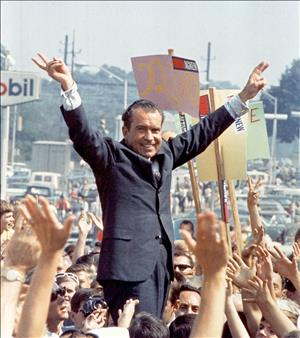On November 5, 1968, Richard Nixon (1913-1994) and Spiro Agnew (1918-1996) defeat Hubert Humphrey (1915-1978) and Edmund Muskie (1914-1996) in the national presidential election by only 50,000 popular votes, but carry 32 states. American Independent Party candidates George Wallace (1919-1998) and Curtis LeMay (1906-1990) win 13 percent of the vote and the electoral votes of five southern states. Washington state and King County voters go for Humphrey and Muskie.
Washington state voters sift through a long ballot including 14 initiatives, bond issues, and referenda to reject a ban on the export of raw logs (I-32) and the prohibition of racial discrimination in housing sales (R-35), while approving a labor-backed 12 percent lid on consumer credit interest (I-245), and breathalizer tests for drivers (I-242). Incumbent Democratic U.S. Senator Warren G. Magnuson (1905-1989) beats State Senator Jack Metcalf (1927-2007).
Governor Dan Evans (b. 1925) and all other incumbent officials win reelection. Slade Gorton (b. 1928) narrowly defeats John McCutcheon to become State Attorney General.
The political context of the 1968 election was as follows:
- On November 30, 1967, Minnesota Senator Eugene McCarthy (b. 1916), an outspoken critic of U. S. involvement in the war in Vietnam, announced that he would run for president of the United States. Lyndon B. Johnson (1908-1973) was the incumbent president.
- On February 29, 1968, New York Democratic Senator Robert Kennedy (1925-1968) and Republican Jacob Javits spoke out against the Vietnam War.
- On March 12, 1968, in the New Hampshire Democratic primary, McCarthy received 42 percent of the vote against Johnson. In the Republican primary, Richard Milhous Nixon received 80 percent of the vote. Nixon had run against John F. Kennedy (1917-1963) in 1960 and lost, and against Democrat California Governor Edmund G. "Pat" Brown in 1962 and lost. He had then "retired" from politics.
- On March 16, 1968, Robert Kennedy announced that he would run for president of the United States. He stated that he was running because "disastrous, divisive policies" in Vietnam could only be changed by a change in administration.
- On March 16, 1968, President Johnson (called LBJ) announced that he would send an additional 35,000 to 50,000 troops to Vietnam.
- On March 31, 1968, President Johnson announced that he would not run for re-election as president of the United States. He stated, "I shall not seek and I will not accept the nomination of my party as your president." He stated that there was "a division in the American house," and that he was withdrawing his candidacy for the sake of national unity. At the time a Gallup Poll gave LBJ an approval rating of 26 percent of the American people. LBJ's withdrawal left three Democrats in the field: Robert Kennedy, Eugene McCarthy, and possibly Vice President Hubert H. Humphrey (1911-1978).
- On April 5, 1968, The Reverend Dr. Martin Luther King Jr. (1929-1968) was assassinated. There were riots in American cities and President Johnson ordered troops to Chicago.
- On April 27, 1968, Vice President Hubert Humphrey announced that he would run for president.
- On May 28, 1968, Eugene McCarthy defeated Robert Kennedy in the Oregon primary.
- On June 4, 1968, minutes after declaring victory in the California primary, Robert Kennedy was shot. He died the next day.
- On August 8, 1968, at Miami Beach, Florida, Republicans nominated Richard M. Nixon as the Republican candidate for president.
- On August 10, 1968, Senator George McGovern, a Democrat from South Dakota, announced that he would run for President.
- On August 29, 1968, at the Democratic Convention, Democrats nominated Hubert Humphrey as the Democratic presidential candidate. The Democratic Convention conducted its business in Chicago in the midst of nationally televised riots involving protesters and police.
- On September 17, 1968, the right-wing American Independent Party nominated George Wallace for president.
- On November 5, 1968, Richard Nixon won the election by 50,000 votes. With 95 percent of the vote counted, Nixon had 29,726,409 votes; Humphrey got 29,677,152 votes; and Wallace got nearly 10,000,000 votes.

